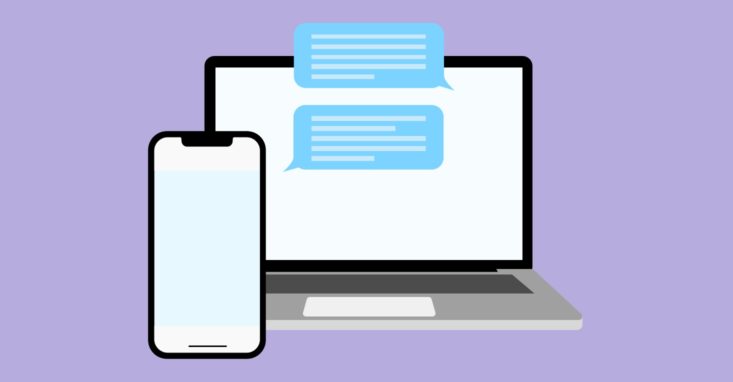
Updated 10/28/20 to include an up-t0-date intro copy.
November 4th is National Stress Awareness Day. It comes at a fitting time: in light of the added uncertainties, worries, and disruptions to our lives due to COVID-19, we need to care for our mental well-being more than ever. Having good mental health is not just about dealing with negative thoughts and emotions. It’s also about motivation, social connection, resiliency, sleep, gratitude, and much more-- concepts I am personally passionate about through my Ph.D. studies in clinical psychology. Balancing the stressors of life can be hard, but know that you are not alone! Mental health apps can offer a wide range of psychological tools to help us heal and improve our inner selves just by opening up our smartphone. While they are not a replacement for professional mental health care, there are many resources that can set you on the right path to feeling better. Some apps focus on improving general well-being by encouraging mindfulness and gratitude. Some combine scientifically-proven methods to target a specific mental health concern, like anxiety or depression. Others provide a digital space to connect with therapists. You can access all of this without stepping out of your home, which is the best part!
Finding the right app that fits your needs can be tough when you don’t have the time or energy to browse through every option on the app store. If you don’t find the perfect one at first, don’t give up. Here is a list of mental health apps to get you started.
The Best Mental Health Apps at Your Fingertips
1. Talkspace
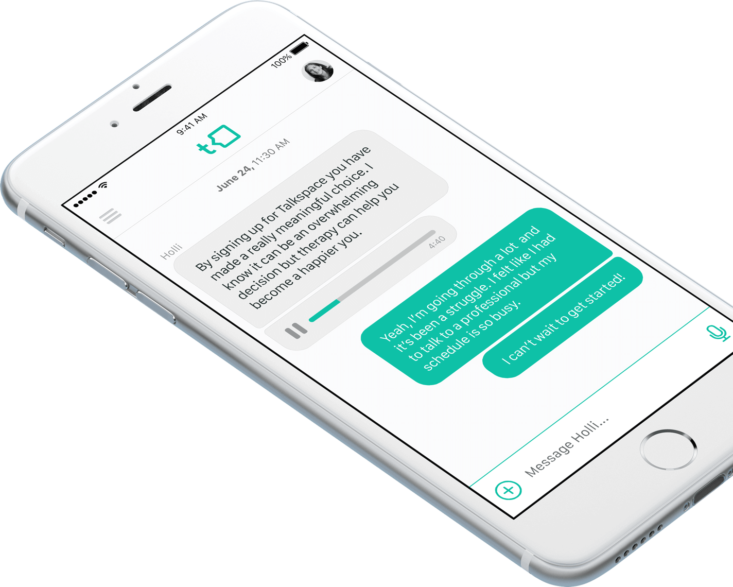
Image via Talkspace.
The Cost: Therapy Plus is $260 per month, $708 every quarter, or $1248 every six months. Therapy Premium is $316 per month, $852 every quarter, or $1512 every six months. Therapy Ultimate is $396 every month, $1068 every quarter, or $1896 every six months. Couples therapy is $396 every month or $1068 every three months. Teens therapy (for ages 13-17) is $260 every month. A-la-carte live video sessions are $65 per 30-minute session.
About the app: Talkspace is another online therapy provider that gives you several communication options. The default therapy plan (Plus) includes text, video, and audio messaging. You can expect your therapist to respond daily, five days per week. Live therapy sessions can be added to your subscription for extra cost: Premium includes one live session per month, while Ultimate includes four live sessions per month. Specialized plans are available for those seeking couples therapy or therapy for teens. You can get a free initial consultation with a Talkspace agent who will give you more information about the service and match you with a therapist.
Available on: iOS, Android, and desktop.
Good to know: Currently, Talkspace is offering additional resources as a response to COVID-19. Talkspace partners with some US health insurance plans to provide online therapy through employee assistance programs (EAP) and behavioral health benefits. Check their list of partners here. They also offer telepsychiatry as a separate service.
2. BetterHelp
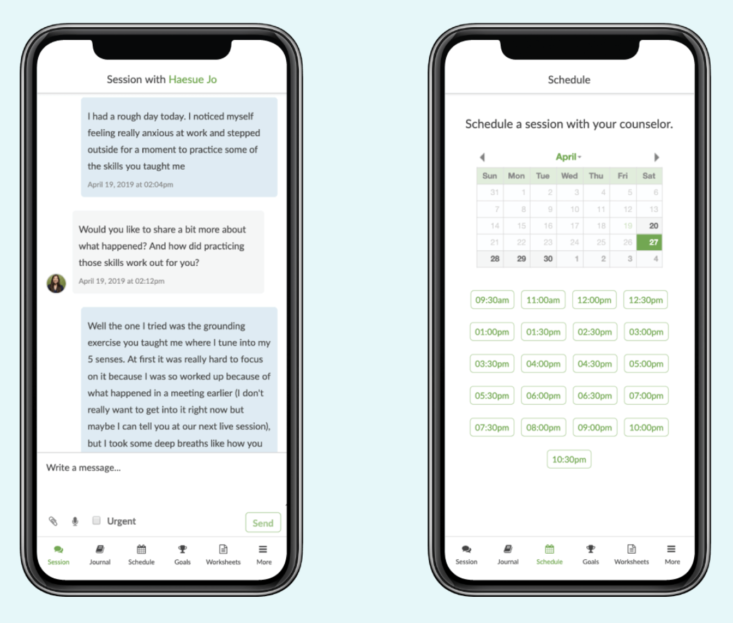
Image via BetterHelp.
The Cost: Unlimited access to your therapist ranging from $80 to $100 per week, billed monthly.
About the app: When self-help apps just don’t cut it, online therapy with a licensed mental health professional may be a good next step. BetterHelp matches you with one of their counselors or therapists so that you can get professional help from the comfort of your home. Your membership comes with unlimited asynchronous text messaging, live text, phone, and video sessions. You and your therapist should agree upon how long, how often, and in what format you want to communicate. If you discover that you and your therapist aren’t a good fit, or if their method of communication isn’t ideal, you can switch therapists through the app.
Available on: iOS, Android, and desktop.
3. Reflectly
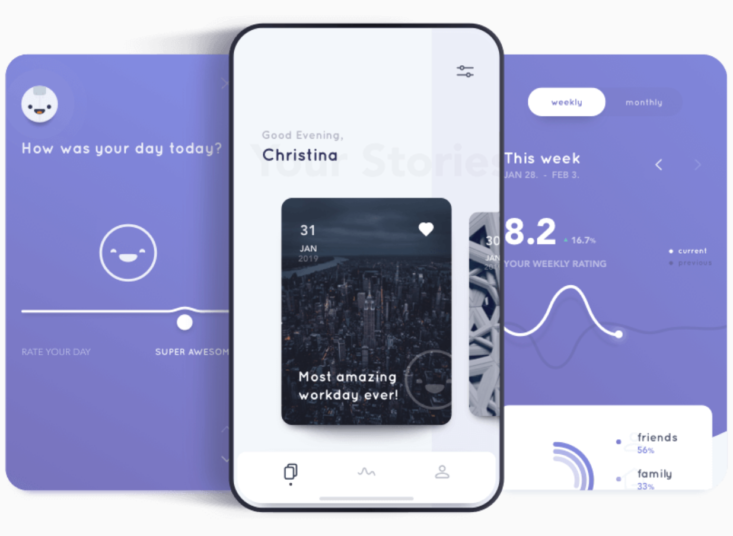
Image via Reflectly.
The Cost: $9.99 per month, $29.99 per year, or $299.99 for a Reflectly Premium lifetime subscription. The free version has limited features.
About this app: Reflectly is a mood tracking, journal, and diary app that uses artificial intelligence to help deal with negative thoughts and build positivity. By recording Moments, which are the mood or journal entries, the app begins to paint a picture of your daily ups and downs. The Insights feature then provides personal statistics on your mood or behavioral patterns over time. Knowledge is power here, and having that knowledge makes it easier to make changes to your life.
Available on: iOS and Android.
4. Day One
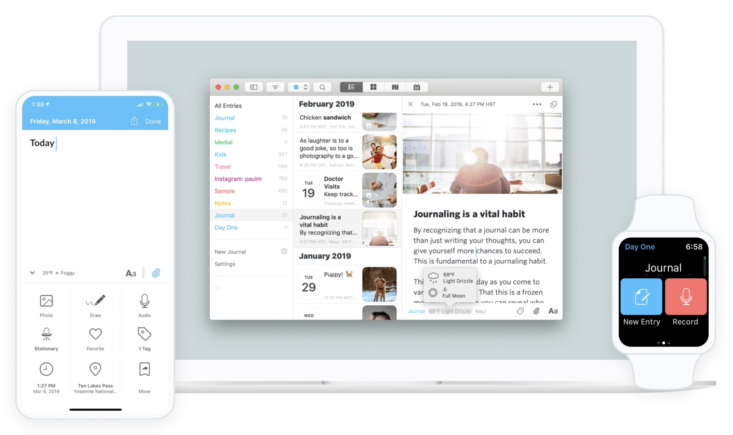
Image via Day One.
The Cost: $34.99/year for Day One Premium. The free version has limited features.
About this app: Journaling is a great way to stay grounded, and Day One is perfect for someone who wants to keep all their memories in a centralized location. This app, with its clean and user-friendly design, secured Apple’s Design Award and was named App of the Year in 2012. What sets Day One apart, though, is that it elevates your journaling experience beyond the standard pen-and-paper format. Text entries can be embellished with photos, videos, drawings, audio recordings, and even PDF attachments. Want more structure or guidance? The app offers journaling templates to help you get those introspective juices flowing. Each entry can be tagged to support filtering and organization. Plus, geotagging and weather tracking gives you the flexibility to enhance a cherished memory.
Available on: iOS, Mac OS, and Android.
5. PTSD Coach
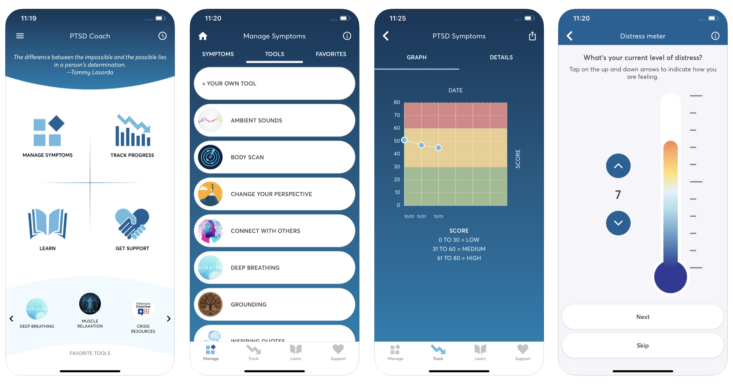
Image via PTSD Coach.
The Cost: Free
About the app: PTSD Coach was developed by the US Department of Veterans Affairs and the Department of Defense. It is a self-help app for people who have experienced trauma or symptoms of post-traumatic stress disorder. Navigation is simple. The app features 4 core sections accessible from a main page: Manage Symptoms, Track Progress, Learn, and Get Support. Take advantage of the sections to educate yourself on the disorder, learn techniques to manage symptoms, and track your symptom severity with regular self-assessment questionnaires. Plus, it provides helpful information for family members who want to learn more about PTSD.
Available on: iOS and Android.
Good to know: PTSD Coach is also available online, although the content and layout differ from the app version.
6. Happify
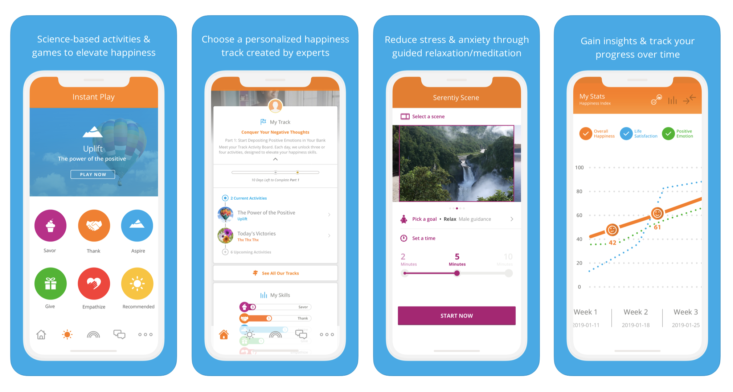
Image via Happify.
The Cost: $14.99 per month, $139.99 per year, or $449.99 for a Happify Plus lifetime subscription. The free version has limited features.
About this app: Happify combines positive psychology and therapeutic principles to help improve your emotional well-being. The app’s pièce de résistance is its “tracks,” which consist of a series of activities and games that each take between 1 to 10 minutes to complete. Tracks are organized by topic, such as Health & Well-Being, Relationships, Family & Kids, and Personal Growth. For the free app, you receive access to 20 out of 100+ tracks. Once you select a track, Happify will unlock several activities every day to keep you moving toward your well-being goals. For those who want play time outside of tracks, the Instant Play section holds extra activities. Meanwhile, the Happify Daily section presents blogs, articles, and videos to keep you inspired.
There are two privacy settings: private mode and community mode. Community mode allows you to actively share posts or send words of encouragement to the Happify community, while private mode removes the pressure to disclose your thoughts to others.
Available on: iOS, Android, and desktop.
Good to know: An account is required to access the app.
7. Sanvello

Image via Sanvello.
The Cost: Due to COVID-19, Sanvello premium access is currently free until July 1, 2020. Usually, the free version has limited features. Sanvello Premium is $8.99 per month. Premium + one-on-one Coaching is $50 per month or $350 per year.
About this app: Sanvello uses principles from cognitive-behavioral therapy (CBT) to help you with anxiety, depression, or stress. The app tracks mood patterns over time and teaches coping skills to manage various stressors. You can also set personal goals and track weekly progress to make sure that you’re on the road to improvement. For those who value social support, Sanvello’s peer community is a good place to find strength and advice from others. If you want additional support, a personal coach is available for confidential one-on-one messaging.
Available on: iOS, Android, and desktop.
Good to know: An account is required to access the app.
8. 7 Cups
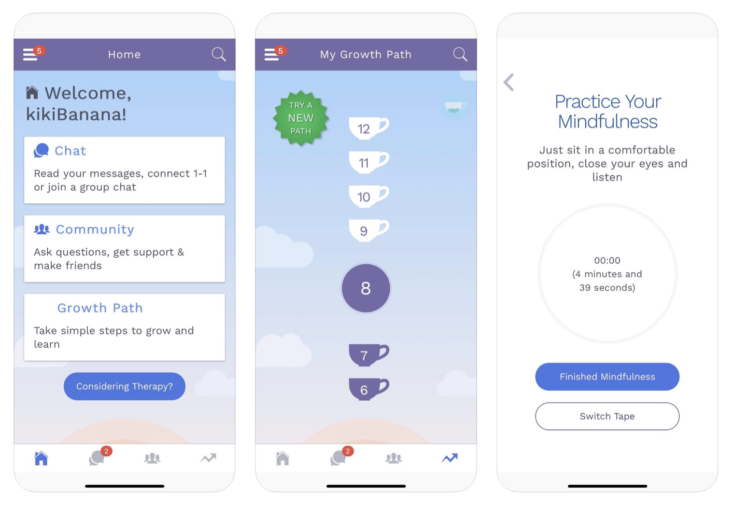
Image via 7 Cups.
The Cost: Free for peer support. Online therapy is available for $150 per month.
About this app: 7 Cups offers peer support in the form of anonymous and confidential text messaging. A chatbot first welcomes you to the app to ease you into the onboard experience. Next, it connects you to volunteers who are trained in active listening and can provide emotional support. If you want extra help from a licensed therapist, online therapy via text messaging is available as well. 7 Cups also includes a “personal growth path” that focuses more on bite-sized self-help modules.
Available on: iOS, Android, and desktop.
Good to know: Want to be a volunteer listener? Register here!
9. Woebot
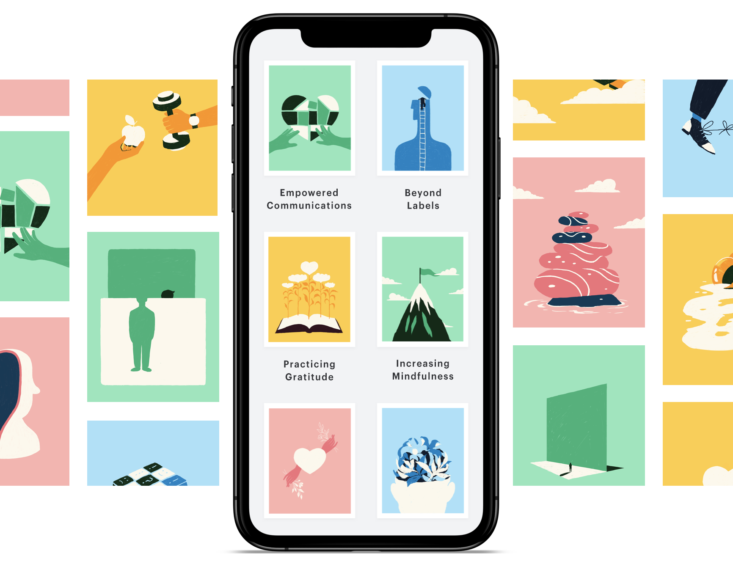
Image via Woebot.
The Cost: Free
About the app: Designed by psychologists at Stanford, Woebot is an artificial intelligence conversational robot (chatbot) that uses CBT principles to help you manage anxiety, depression, and stress. Woebot calls itself “your self-care expert” by helping you track mood patterns over time, think through difficult situations, and learn ways to cope. You can respond with text, emoji, and even gifs, which can make interactions with Woebot feel more natural. Depending on your immediate needs, Woebot then offers relevant videos, lessons, and exercises to help you build a repertoire of mental health-boosting skills.
Available on: iOS and Android.
10. Calm

Image via Calm.
The Cost: Free 7-day free trial with an annual subscription, then $69.99 per year. $399.99 for a lifetime subscription. The free version includes a handful of free sessions.
About this app: Calm uses a more unstructured approach to mindfulness and meditation. Its aesthetics are rooted in nature-- the app’s main page features a mountain view with rippling water in the foreground while songbirds chatter away (make sure you turn your volume on). Sessions are categorized by topic, like Mental Fitness, Sleep Stories, and Calm Kids. Calm also partners with mindfulness experts, celebrities, and athletes to bring their own flavor to the table. There is even a great selection of music, ambient sounds, or nature scenes to help you relax or meditate on your own.
Available on: iOS, Android, and desktop.
11. Headspace
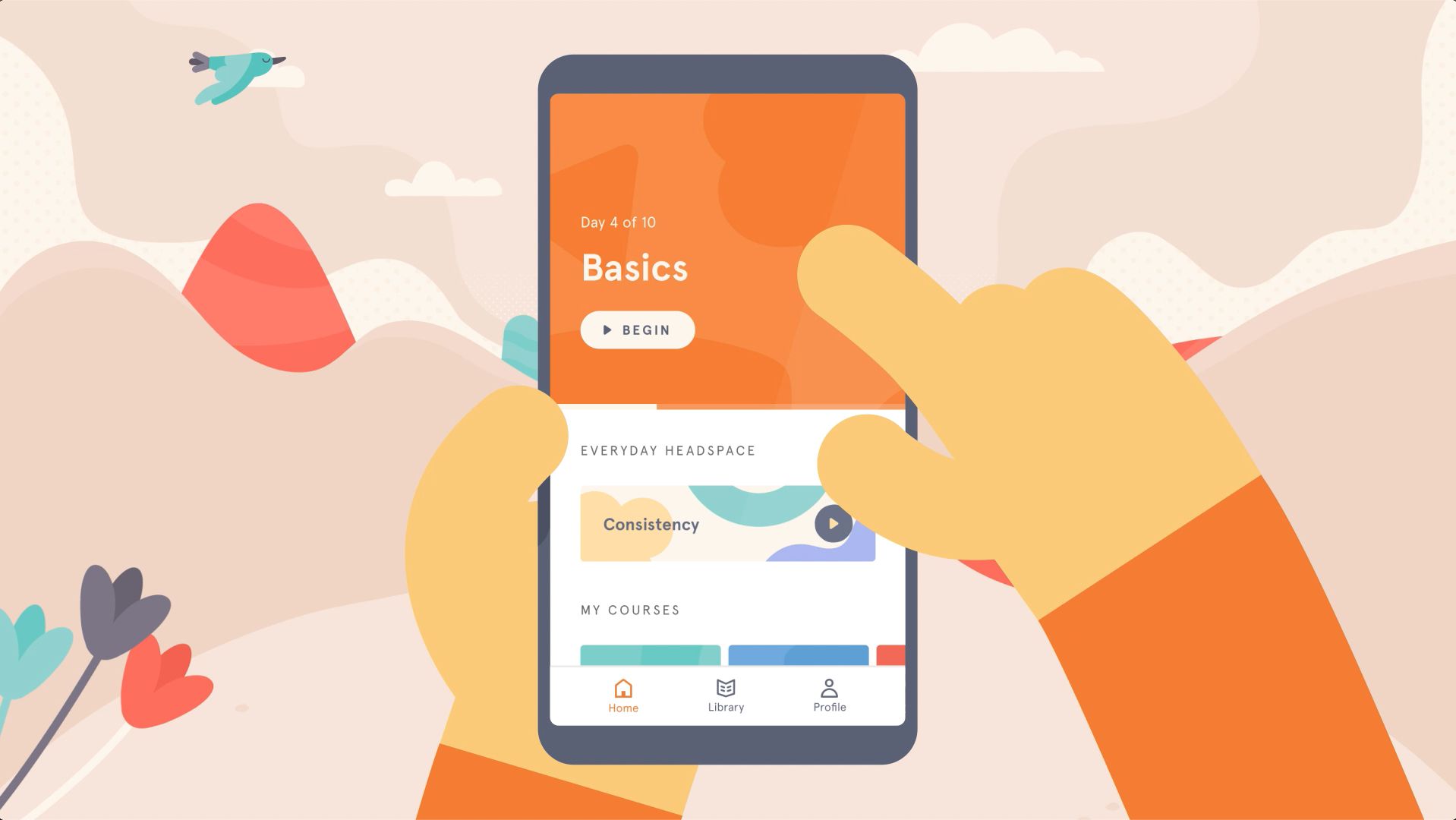
Image via Headspace.
The Cost: Free 7-day trial with a monthly subscription; $12.99/month after the free trial ends. Free 14-day trial with an annual subscription, then $69.99 per year. Headspace includes about a dozen sessions for free.
About this app: Headspace focuses on guided meditation and mindfulness. It has an easy-to-use app interface with friendly cartoon art on each page. The selection ranges from introductory mindfulness lessons, to nighttime meditation exercises, to courses with topics like anger, sadness, and restlessness. There are even sessions for kids of varying ages. You can choose between a male or female voice for some- but not all- meditations. It’s great for beginners since many sessions have structure and progression, but meditators of all degrees of experience can benefit.
Available on: iOS, Android, and desktop.
Good to know: Headspace currently offers its subscription for free to those who are unemployed in the US. Students can get the subscription for $9.99 per year with the student plan. There is also a family plan for $99.99 per year for 6 accounts.
----
Even though mental health apps can provide relief, they are not a replacement for help in times of crisis. If you are in crisis or someone you know may be in danger, contact your local emergency number, suicide prevention hotline (1-800-273-8255 for US), the crisis text line (741741 for US and Canada), or the nearest emergency or urgent care department.
Looking for more wellness subscriptions and services?
Check out these articles and reviews:
- 16 Best Meditation Apps to Help Calm Your Mind
- The MSA Guide to Subscriptions for Staying Home & Staying Healthy
- 26 Subscriptions to Build Healthy Habits
- Popular Vitamin Subscriptions Compared (Ritual vs. Persona vs. Care/of)
How have you been prioritizing your mental health? Have any of the apps on this list worked well for you? Tell us in the comments.
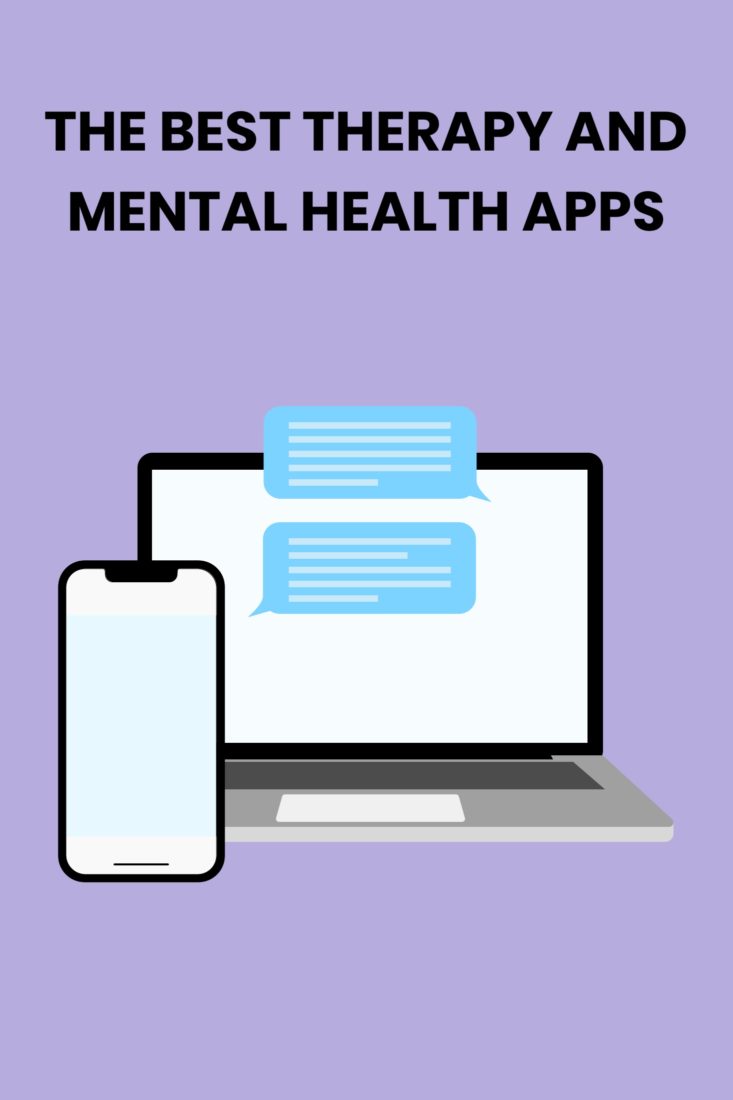





Please do not enter your email address in the Name field or in the comment content. Your email address will not be published. Required fields are marked *. Remember to post with kindness and respect. Comments with offensive language, cruelness to others, etc will not be approved. See our full comment policy here.